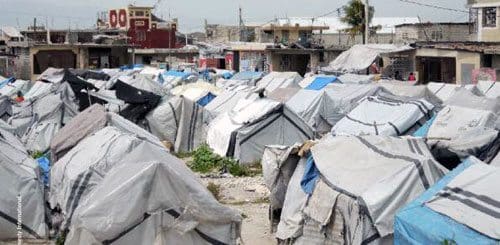More than three years after the devastating earthquake that left over 200,000 people dead and some 2.3 million homeless, tens of thousands of families are still living in shelters made of frayed tarpaulins or tin sheets. The majority of internally displaced persons are women and children. For them, home has been anything but a place of comfort and security.
Life for those made homeless on 12 January 2010 has been a seemingly endless ordeal, as they have struggled to make a life for themselves and their families with little access to safe drinking water, sanitation, health care, schools or other essential services. Insecurity, chronic unemployment and threats of forced eviction have pushed them even deeper into poverty. Against this backdrop, their resilience and determination to live in dignity bears testament to the enormous potential among Haiti's people for reconstruction and a better future – a potential that has been largely thwarted by chronic and widespread failures of the Haitian authorities to guarantee their human rights.
In Haitian society, women are seen the central pillar of the household (fanm se poto mitan). It is they who carry the responsibility in the overwhelming majority of households for looking after children, doing household chores and, in some cases, caring for elders or other family members. In many cases, women are also the main providers for their families, working primarily in the informal sector. However, the recognition of women's central role is not devoid of contradictions. Discrimination, gender-based violence, the increasing burden of poverty on women (particularly on women-headed households) and exclusion from power and decision-making, affect most women's lives on a daily basis. These have an impact on women's capacity to enjoy their human rights including their right to adequate housing. Nowhere is this exclusion and its consequences more acutely felt than in the camps for displaced people that sprang up following the earthquake: poverty, gender-based violence, lack of or limited access to water, sanitation and other services, and inadequate living conditions.
The number of internally displaced people and the number of makeshift camps have been decreasing since the July 2010 peak of some 1.5 million people living in 1,555 camps. Thousands of families have left the camps for temporary shelter or other types of accommodation made available through different projects and programmes coordinated by the Haitian government, with the support of various international agencies. However, forced evictions appear to have become an important factor behind the reduction in camp numbers. Amnesty International has documented a pattern of forced evictions of internally displaced families, carried out or condoned by the authorities. Forced evictions are evictions that are carried out without the legal and procedural safeguards that are required under various international human rights treaties that Haiti is a party to. These include genuine consultation with those affected to identify all feasible alternatives to evictions, provision of adequate notice, access to legal remedies, compensation, and alternative housing for those who cannot provide for themselves. The Haitian Constitution also recognizes the right to decent housing.
According to the latest figures issued by the International Organization for Migration (IOM), as of the end of March 2013, 16,104 families had been forcibly evicted from private and public land or properties without access to legal remedies or alternative accommodation. The overwhelming majority of such evictions have involved people claiming to own the land or landowners reclaiming possession of properties from displaced people through intimidation and violence. Some, although fewer in number, are connected to planned official projects to restore public spaces, involving local officials and the police. The IOM also reported that more than 21,000 families – approximately 75,000 individuals, nearly one in four of those living in makeshift camps – were threatened with forced eviction by private landowners or the authorities.
This report shows how the government has failed to protect people from forced evictions and other human rights violations in the post-quake reconstruction process. The report also briefly discusses the failure of the draft national housing policy to address these issues and to set out a policy framework aimed at guaranteeing the right to adequate housing, protection from non-discrimination and the right to equality.
To make the right to adequate housing a reality for all, the government of Haiti must put human rights at the heart of the reconstruction effort and its national policy on housing. It must ensure that all sectors of society are fully involved in devising and implementing housing policy and put in place and enforce legal safeguards against forced evictions. The report is part of Amnesty International's Demand Dignity campaign, which focuses on human rights violations that drive and deepen poverty. As part of the campaign, Amnesty International is focusing on human rights violations against people living in informal settlements and slums. Amnesty International is also calling on all governments to end forced evictions, ensure equal access to public services, and promote the active participation of people living in informal settlements and slums in decisions and processes that impact their lives.

